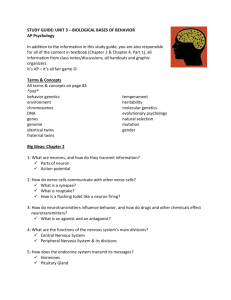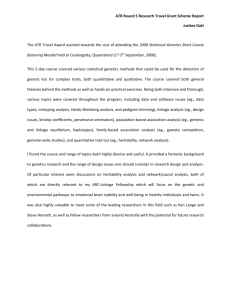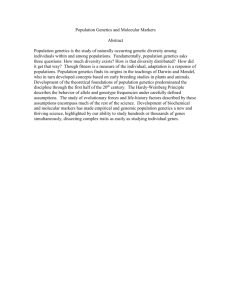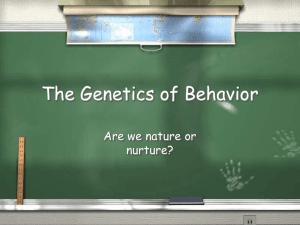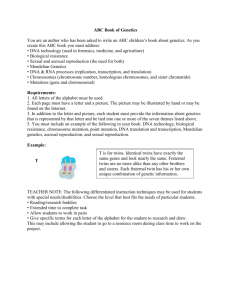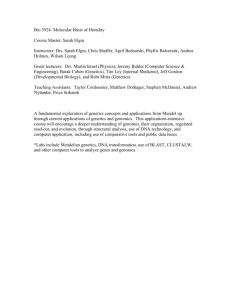AP Psychology
advertisement
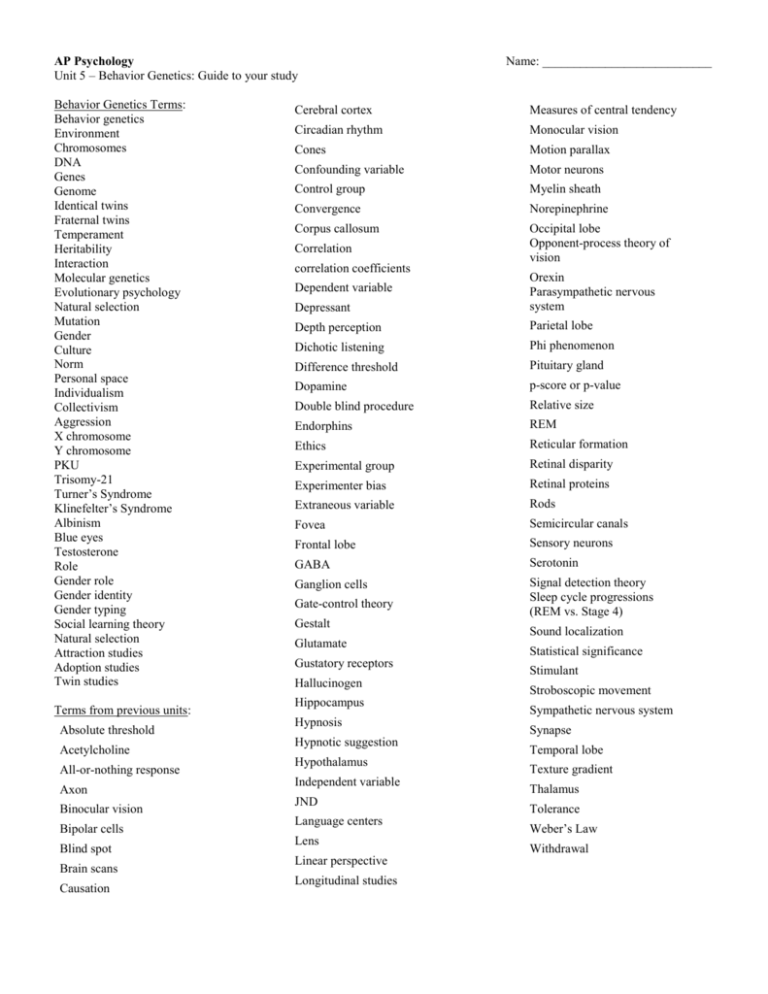
AP Psychology Unit 5 – Behavior Genetics: Guide to your study Behavior Genetics Terms: Behavior genetics Environment Chromosomes DNA Genes Genome Identical twins Fraternal twins Temperament Heritability Interaction Molecular genetics Evolutionary psychology Natural selection Mutation Gender Culture Norm Personal space Individualism Collectivism Aggression X chromosome Y chromosome PKU Trisomy-21 Turner’s Syndrome Klinefelter’s Syndrome Albinism Blue eyes Testosterone Role Gender role Gender identity Gender typing Social learning theory Natural selection Attraction studies Adoption studies Twin studies Terms from previous units: Absolute threshold Acetylcholine All-or-nothing response Axon Binocular vision Bipolar cells Blind spot Brain scans Causation Name: ___________________________ Cerebral cortex Measures of central tendency Circadian rhythm Monocular vision Cones Motion parallax Confounding variable Motor neurons Control group Myelin sheath Convergence Norepinephrine Corpus callosum Occipital lobe Opponent-process theory of vision Correlation correlation coefficients Depressant Orexin Parasympathetic nervous system Depth perception Parietal lobe Dichotic listening Phi phenomenon Difference threshold Pituitary gland Dopamine p-score or p-value Double blind procedure Relative size Endorphins REM Ethics Reticular formation Experimental group Retinal disparity Experimenter bias Retinal proteins Extraneous variable Rods Fovea Semicircular canals Frontal lobe Sensory neurons GABA Serotonin Ganglion cells Signal detection theory Sleep cycle progressions (REM vs. Stage 4) Dependent variable Gate-control theory Gestalt Glutamate Gustatory receptors Hallucinogen Hippocampus Hypnosis Hypnotic suggestion Hypothalamus Independent variable JND Language centers Lens Linear perspective Longitudinal studies Sound localization Statistical significance Stimulant Stroboscopic movement Sympathetic nervous system Synapse Temporal lobe Texture gradient Thalamus Tolerance Weber’s Law Withdrawal Chapter Review: Nature, Nurture and Human Diversity 1. What are genes, and how do behavior geneticists explain our individual differences? 2. What is heritability and how does it relate to individuals and groups? 3. What is the promise of molecular genetics research? 4. How do evolutionary psychologists use natural selection to explain behavior tendencies? 5. How might an evolutionary psychologist explain gender differences in mating preferences? 6. What are the key criticisms in evolutionary psychology? 7. To what extent are our lives shaped by early stimulation, by parents, and by peers? 8. How do cultural norms affect our behavior? 9. How do individualist and collectivist cultural influences affect people? 10. What are some ways in which males and females tend to be alike and to differ? 11. How do nature and nurture together form gender? 4. The extend to which varation among members of a group can be attributed to genes is called a. Fraternal genetics b. Maternal genetics c. Behavior genetics d. Interaction e. Heritability 5. Your genetic code a. Exists only in the cells of the nervous system b. Disappears gradually as the developmental processes it governs are completed c. Is influenced by early environmental experiences d. Exists in its entirety in every cell of your body e. Exists only in the cells of the reproductive system 6. When a mother’s egg and the father’s sperm unite, each contributes a. 23 chromosomes b. 1 chromosome pair c. 23 chromosome pairs d. 30,000 chromosome pairs e. 30,000 chromosomes 7. Heritability refers to the percentage of a. Group variation in a trait that can be explained by the environment b. Traits shared by identical twins c. Traits shared by fraternal twins d. Traits shared by adopted children and their birth parents e. Group variation in a trait that can be explained by genetics 8. The study of specific genes and teams of genes that influence behavior is called a. Molecular genetics b. Evolutionary psychology c. Behavior genetics d. Heritability e. Natural selection 9. The interplay of environment and heredity is called a. Heritability b. Mutation c. Interaction d. Molecular genetics e. Behavior genetics Practice Questions on Behavior Genetics 1. 2. 3. One major criticism of the evolutionary perspective in psychology is that a. It analyzes after the fact using hindsight b. It attempts to extend a biological theory into a psychological realm c. There is very little evidence to support it d. It has not been around long enough to stand the test of time e. It seems to apply in certain cultures but not in others Evolutionary psychologists seek to understand how traits and behavioral tendencies have been shaped by a. Natural selection b. Genes c. Prenatal nutrition d. DNA e. Chromosomes Which of the following is not one of the main criticisms of the evolutionary psychology explanation of human sexuality? a. This perspective starts with an effect and works backward to propose an explanation b. This perspective discounts important genetic influences c. Unethical and immoral men could use such explanations to rationalize their behavior toward women d. This explanation overlooks the effects of cultural expectations and socialization e. This explanation does not consider the importance of individual choices in any given situation
